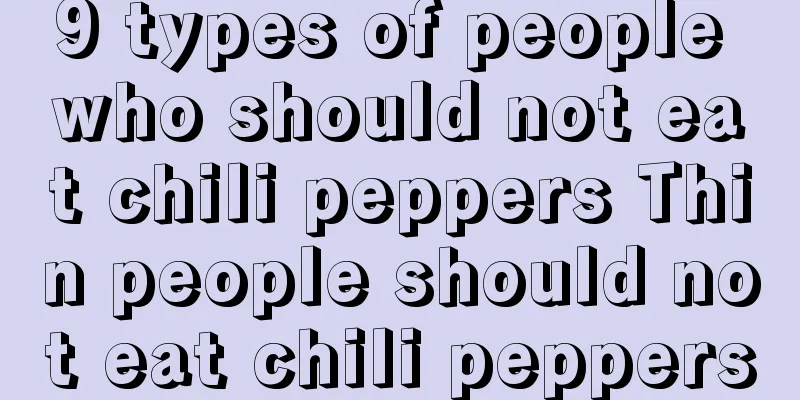9 types of people who should not eat chili peppers Thin people should not eat chili peppers

|
1. Patients with conjunctivitis and keratitis Xiao Li, 22 years old, is a Grade 10 student at a certain university. He returned to campus a few days ago and asked his classmates to have a midnight snack. Since they all like spicy food, they ordered all spicy dishes. Unexpectedly, the day before yesterday, Xiao Li's eyes felt hot and his eyelids were swollen. After going to the hospital for a check-up, he was diagnosed with conjunctivitis. After asking, the doctor said that his illness was related to his love for spicy food. Experts explain that hot spices such as peppers can cause the blood vessels in the eyes to dilate and become congested, leading to a decrease in the eye's resistance and making people more susceptible to conjunctivitis. In addition, spicy food should be avoided in summer and the diet should be light. Therefore, patients with symptoms such as conjunctivitis and keratitis should resolutely avoid eating chili peppers during the illness period. Because eating chili peppers can easily cause internal heat, which can aggravate the condition. 2. Patients with hemorrhoids Although peppers are rich in vitamin C, they can stimulate the taste buds and make people have an appetite in the hot summer. However, because peppers are very irritating, patients with hemorrhoids are prone to congestion and edema of the hemorrhoidal veins after eating peppers, which further aggravates the hemorrhoids and leads to the formation of anal abscesses. In addition, chili pepper can aggravate constipation and make hemorrhoids more severe. Therefore, patients with hemorrhoids should never eat chili peppers in summer. 3. People who take Chinese medicine Consuming capsaicin will affect the efficacy of traditional Chinese medicine, so spicy food should be avoided while taking traditional Chinese medicine. People who take Chinese medicine should have a lighter diet and avoid eating hot peppers and any food containing irritants, otherwise it will cause a relapse of the disease. 4. Patients with chronic cholecystitis, cholelithiasis, and pancreatitis Due to the stimulation of capsaicin, gastric acid secretion increases. Excessive gastric acid can cause gallbladder contraction and spasm of the sphincter of the bile duct, making it difficult for bile to be discharged, thereby inducing cholecystitis, biliary colic and pancreatitis. In addition, patients with such symptoms should eat more foods containing crude fiber and avoid irritating foods such as radishes, peppers, onions, etc. Otherwise, biliary colic may occur easily and the condition may become more serious. 5. Patients with cardiovascular and cerebrovascular diseases
6. Patients with kidney disease
Capsaicin is excreted through the kidneys and can damage renal parenchymal cells. In severe cases, it can cause changes in renal function or even renal failure. 7. Pregnant women
8. Hyperthyroidism patients
9. Thin people should not eat chili peppers
|
Recommend
What to do if the knee joint tendon is strained?
Knee joint strain is a joint disease caused by ex...
Treatment, causes and prevention of cervical stenosis
Cervical stenosis is a very common cervical disea...
What are the symptoms of cholestatic liver disease
Cholestatic liver disease usually presents with s...
How many days does it take for the chickenpox itch to heal
The causes of chickenpox are quite complicated, s...
Seven things to know about preventing gastric cancer
Gastric tumor is a malignant tumor disease, and i...
What are cheek pimples?
If we pay attention to observe our bodies, we wil...
Twenty-one Golden Vita
Many of us are very familiar with Twenty-One Gold...
What are the dangers of high arches
A high arch refers to a concave shape of the sole...
What are the symptoms of malignant lymphoma?
The symptoms of malignant lymphoma are a hot topi...
What are the 5 liver function test items?
Many people are familiar with liver function test...
Can I do the face-lift injection and chin-lift injection together?
Modern people attach great importance to self-ima...
How do I know if I have lung cancer? If you have these 4 abnormalities in your body, it may be lung cancer
When I was watching the news, I found a case of l...
Cervical lymph node puncture biopsy
There are lymph nodes all over our body, and they...
Prostate cancer treatment costs
Prostate cancer is one of the most common maligna...
What are the acupuncture points for moistening the intestines and relieving constipation
Constipation is a relatively common disease. When...









